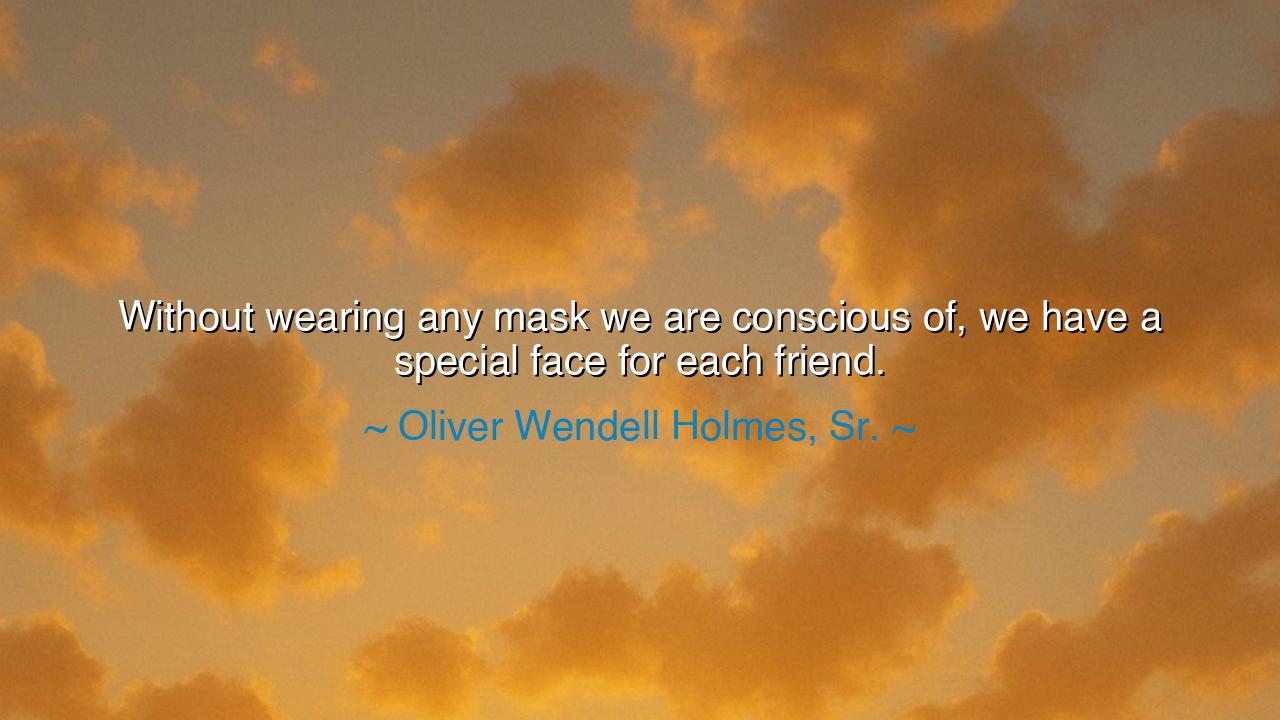
Without wearing any mask we are conscious of, we have a special






In the reflective and piercing words of Oliver Wendell Holmes, Sr., physician, philosopher, and poet of the human soul, we find an insight that reaches deep into the heart of human nature: “Without wearing any mask we are conscious of, we have a special face for each friend.” This saying, delicate yet profound, reveals a truth that has followed humankind through every age — that even in our sincerity, we are not one face, but many. Without deception, without intent, we shift and transform before those we love, showing not falseness, but different reflections of our true self. Holmes does not accuse us of hypocrisy; rather, he unveils the intricate dance of personality and intimacy that shapes every friendship, every encounter, every human bond.
The meaning of his words lies in understanding that each person we meet draws forth a different side of who we are. To one friend, we may be a counselor, calm and measured; to another, a companion of laughter and mischief; to yet another, a quiet confidant who speaks little but listens deeply. None of these faces are false — they are all authentic expressions of the self, shaped by the energy and nature of the soul that stands before us. The human heart, vast and multifaceted, cannot reveal all its truths to all people. Friendship is an act of mirroring — we become the reflection of the bond we share. Holmes’s wisdom, therefore, reminds us that the heart wears many garments, all woven of the same thread, yet each suited to a different companion.
Holmes himself was a man who walked between many worlds — the healer, the poet, the philosopher, the father of a famous son. His origin of this insight likely sprang from the keen observation of human character he gained through both his medical practice and his literary circle. Living in the 19th century, he stood among the great thinkers of the New England Renaissance, surrounded by minds like Emerson, Longfellow, and Lowell. In conversation with such souls, he would have seen how each mind reveals itself differently depending on the listener, how truth itself changes its hue under different lights. He saw that sincerity does not mean sameness. To live honestly does not mean to be unchanging, for to meet each friend as they are is to honor them — and to become, for a moment, the self they most need to see.
The ancients, too, understood this. Socrates, as remembered by Plato, spoke differently to each of his companions: with Glaucon, he reasoned through ambition; with Crito, he spoke of justice and mortality; with Phaedrus, he pondered love and the soul’s immortality. Was Socrates a different man to each of them? No — he was the same soul expressed through many channels. So it is with all who live fully. The wise are not one voice speaking to all, but many voices drawn from one truth. For as the river bends to the shape of the land yet remains one water, so the spirit bends to the hearts it meets, without losing its essence.
History, too, bears witness to this truth in the life of Abraham Lincoln. To his generals, he was resolute yet merciful; to his cabinet, cautious yet visionary; to his wife, tender yet weary; to the people, humble yet strong. He wore no mask — his sincerity was beyond question — but he showed a different face to each, because the weight of his love and duty required it. Those who knew him said he seemed to become whatever his company needed most: a listener to the grieving, a guide to the lost, a strength to the broken. This, Holmes’s words suggest, is the art of being deeply human — not to be one unmoving face to all, but to be many honest reflections of one soul’s truth.
And yet, Holmes’s insight carries a note of caution. It asks us to remain conscious of the faces we wear, lest we lose sight of who we truly are. For though it is natural to change our tone, our posture, our presence with each person, it is perilous when the heart itself begins to shift for approval or fear. To have a special face for each friend is the mark of empathy and wisdom; but to wear a mask for all is the mark of exhaustion and loss. Thus, Holmes reminds us that sincerity is not sameness — but neither is it disguise. True friendship allows the self to unfold naturally, without performance.
The lesson we draw from Holmes’s wisdom is both humbling and ennobling. We are not fixed beings, but living mosaics of light and shadow, shaped by every bond we form. Cherish this truth, for it reveals the sacredness of connection — that every friend draws forth something within us that no one else can touch. Yet, remain anchored in your own spirit, lest the tide of relationships scatter your being into fragments. Be genuine, but adaptable; constant, but compassionate. In this balance lies the art of living well.
So, dear listener, remember this: “Without wearing any mask we are conscious of, we have a special face for each friend.” Do not fear the change of countenance that friendship brings, for it is a sign of the soul’s depth. But let every face you wear be true, born of care, not calculation. In honoring each friend’s uniqueness, you reveal the vastness of your own spirit. For the heart that can meet others as they are, yet remain whole in itself, has mastered one of life’s greatest arts — the art of being human in its fullest, truest form.






AAdministratorAdministrator
Welcome, honored guests. Please leave a comment, we will respond soon